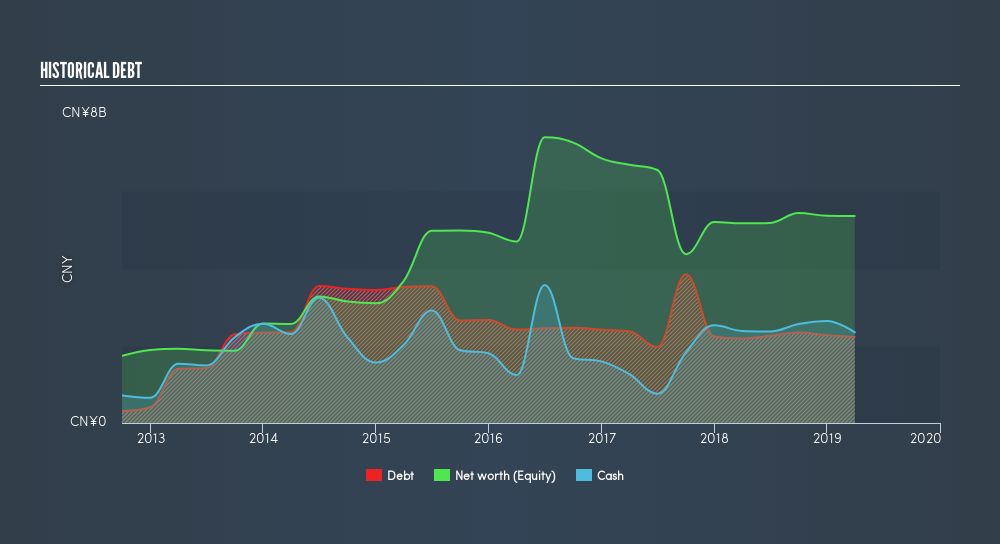
The external fund manager backed by Berkshire Hathaway's Charlie Munger, Li Lu, makes no bones about it when he says 'The biggest investment risk is not the volatility of prices, but whether you will suffer a permanent loss of capital.' When we think about how risky a company is, we always like to look at its use of debt, since debt overload can lead to ruin. Importantly, 21Vianet Group, Inc. (NASDAQ:VNET) does carry debt. But is this debt a concern to shareholders?
What Risk Does Debt Bring?
Generally speaking, debt only becomes a real problem when a company can't easily pay it off, either by raising capital or with its own cash flow. If things get really bad, the lenders can take control of the business. While that is not too common, we often do see indebted companies permanently diluting shareholders because lenders force them to raise capital at a distressed price. Of course, debt can be an important tool in businesses, particularly capital heavy businesses. When we examine debt levels, we first consider both cash and debt levels, together.
See our latest analysis for 21Vianet Group
What Is 21Vianet Group's Net Debt?
As you can see below, at the end of March 2019, 21Vianet Group had CN¥3.14b of debt, up from CN¥2.99b a year ago. Click the image for more detail. However, because it has a cash reserve of CN¥2.35b, its net debt is less, at about CN¥798.6m.

How Strong Is 21Vianet Group's Balance Sheet?
According to the last reported balance sheet, 21Vianet Group had liabilities of CN¥2.29b due within 12 months, and liabilities of CN¥4.30b due beyond 12 months. On the other hand, it had cash of CN¥2.35b and CN¥661.8m worth of receivables due within a year. So its liabilities total CN¥3.58b more than the combination of its cash and short-term receivables.
This deficit is considerable relative to its market capitalization of CN¥5.72b, so it does suggest shareholders should keep an eye on 21Vianet Group's use of debt. Should its lenders demand that it shore up the balance sheet, shareholders would likely face severe dilution.
In order to size up a company's debt relative to its earnings, we calculate its net debt divided by its earnings before interest, tax, depreciation, and amortization (EBITDA) and its earnings before interest and tax (EBIT) divided by its interest expense (its interest cover). The advantage of this approach is that we take into account both the absolute quantum of debt (with net debt to EBITDA) and the actual interest expenses associated with that debt (with its interest cover ratio).
21Vianet Group has a very low debt to EBITDA ratio of 0.90 so it is strange to see weak interest coverage, with last year's EBIT being only 1.1 times the interest expense. So one way or the other, it's clear the debt levels are not trivial. We also note that 21Vianet Group improved its EBIT from a last year's loss to a positive CN¥223m. The balance sheet is clearly the area to focus on when you are analysing debt. But it is future earnings, more than anything, that will determine 21Vianet Group's ability to maintain a healthy balance sheet going forward. So if you want to see what the professionals think, you might find this free report on analyst profit forecasts to be interesting.
But our final consideration is also important, because a company cannot pay debt with paper profits; it needs cold hard cash. So it's worth checking how much of the earnings before interest and tax (EBIT) is backed by free cash flow. Over the most recent year, 21Vianet Group recorded free cash flow worth 64% of its EBIT, which is around normal, given free cash flow excludes interest and tax. This free cash flow puts the company in a good position to pay down debt, when appropriate.
Our View
21Vianet Group's interest cover was a real negative on this analysis, although the other factors we considered cast it in a significantly better light. For example, its conversion of EBIT to free cash flow is relatively strong. Looking at all the angles mentioned above, it does seem to us that 21Vianet Group is a somewhat risky investment as a result of its debt. That's not necessarily a bad thing, since leverage can boost returns on equity, but it is something to be aware of. Even though 21Vianet Group lost money on the bottom line, its positive EBIT suggests the business itself has potential. So you might want to check outhow earnings have been trending over the last few years.
When all is said and done, sometimes its easier to focus on companies that don't even need debt. Readers can access a list of growth stocks with zero net debt 100% free, right now.
We aim to bring you long-term focused research analysis driven by fundamental data. Note that our analysis may not factor in the latest price-sensitive company announcements or qualitative material.
If you spot an error that warrants correction, please contact the editor at editorial-team@simplywallst.com. This article by Simply Wall St is general in nature. It does not constitute a recommendation to buy or sell any stock, and does not take account of your objectives, or your financial situation. Simply Wall St has no position in the stocks mentioned. Thank you for reading.
About NasdaqGS:VNET
VNET Group
An investment holding company, provides hosting and related services in China.
Reasonable growth potential low.
Similar Companies
Market Insights
Community Narratives


